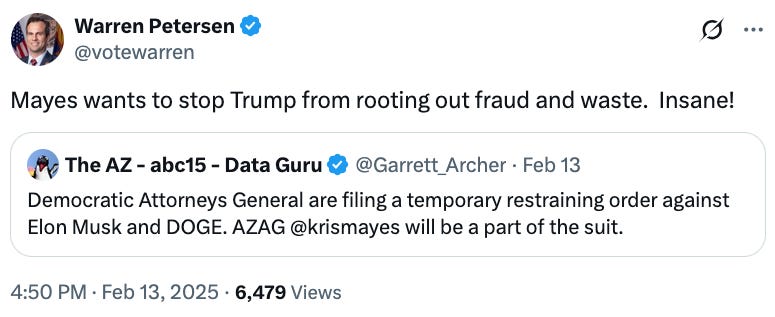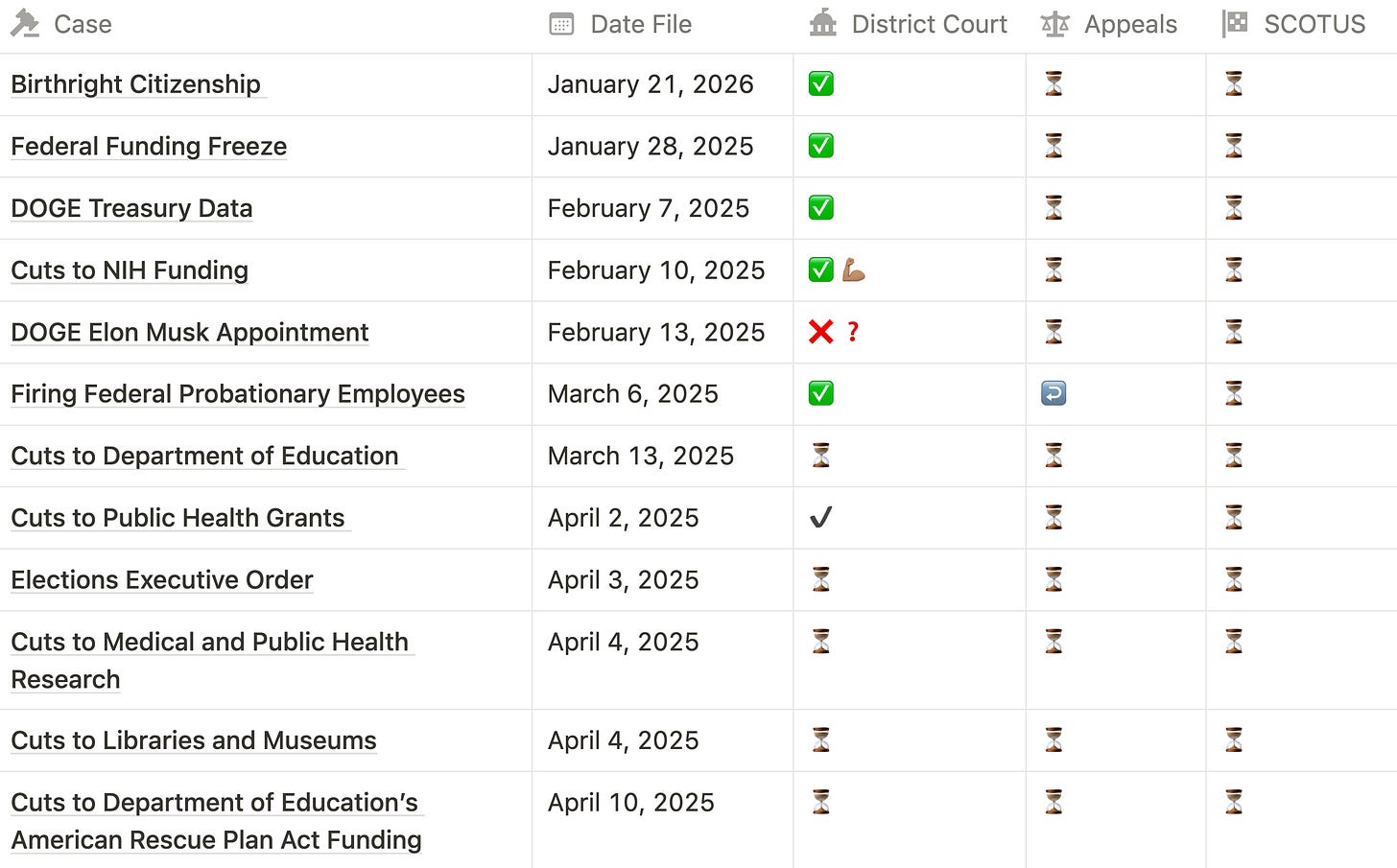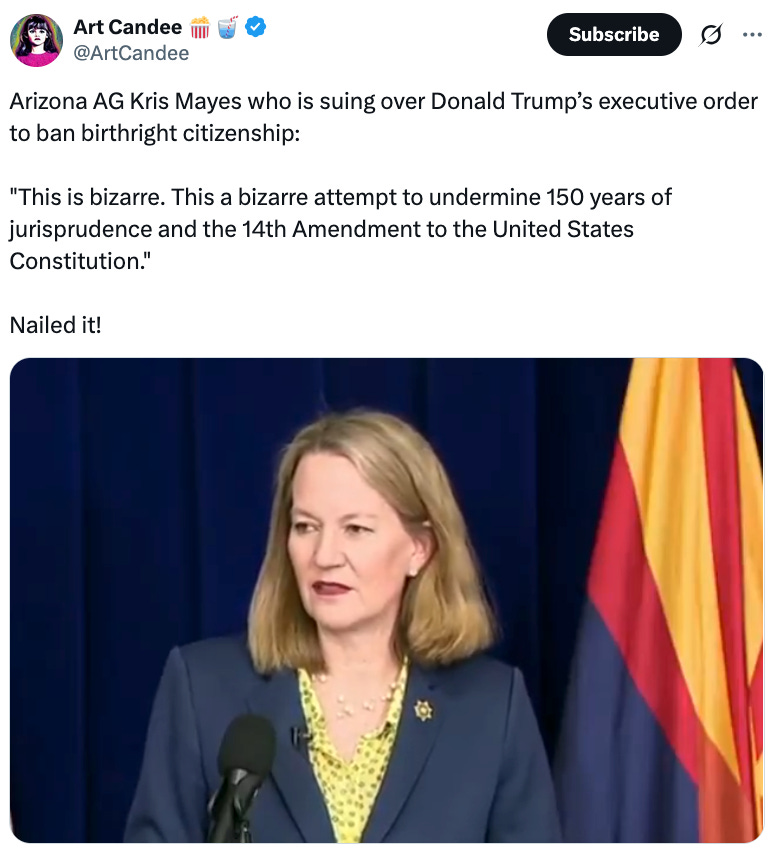
Mayes Against the Machine
Attorney General Kris Mayes has joined 12 federal lawsuits against the Trump administration, with a yuuuuge rate of success … so far.
When she was campaigning to be the state’s top law enforcement officer, Arizona Attorney General Kris Mayes liked to play off the right-wing narrative against her: that she is a radical.
One of her campaign ads, for example, includes audio of right-wingers calling her a member of the “deranged radical left” — juxtaposed against clips of her dropping her kid off at school, joining a Zoom call wearing pajama pants and buttering toast.
“What are you doing, Kris?” a disembodied voice asks from behind the camera.
“Just being radical,” the former Republican replies, propped up on a couch reading Cindy McCain’s memoir.
More than two and a half years after Mayes barely won the attorney general’s race with a razor-thin 280-vote advantage, most of Arizona’s Republicans would probably still group her in with the radical left.
As Donald Trump attempts to radically upend the fundamentals of American democracy, advocating for the status quo has become a radical position.
In the three months that Donald Trump has been in office, Mayes has already sued the Trump administration 12 times alongside a coalition of 23 Democratic attorneys general who have banded together to challenge sweeping changes to the federal government.
She has used her position to tell anyone who will listen that we’re in the middle of a coup, as Trump refuses to obey court orders and has allowed the richest man in the world, Elon Musk, to wield an inordinate amount of power with zero accountability.
Paradoxically, one of her strongest tools against this Republican “coup” has been the “federalism office” that her Republican predecessor set up. Back in 2015, Republican lawmakers and former Gov. Doug Ducey gave then-AG Mark Brnovich $1 million to start a unit within the AG’s office dedicated to safeguarding states' rights and pushing back against federal overreach under former President Barack Obama.
Now, Mayes is using that principle to challenge Trump’s subversion of state sovereignty.
Mayes’ lawsuits are challenging actions like Trump’s dismantling of the Department of Education and slashing of public health grants — ideas that even many centrist Republicans can probably get behind.
But the force and speed with which she has brought those challenges has helped distinguish Mayes from many weak-kneed Democrats — and made her a hero to Arizona’s progressive left.
After Trump declared birthright citizenship no longer legal, for example, Democratic Gov. Katie Hobbs urged the president online to “reconsider (the) policy that attacks our country's ideals and does nothing to secure our border.”
She followed that up with the caveat: “However, I'm glad President Trump has taken action on border security targeting drug smuggling and human trafficking.”
Meanwhile, Mayes was appalled, calling it a “bizarre attempt to undermine 150 years of jurisprudence and the 14th Amendment to the United States Constitution.” Then Mayes joined other states’ attorneys general to get the order halted the day after it was announced.
While Democratic lawmakers and governors take varying give-and-take approaches to Trumpism, Mayes is in a different political position. It’s the state Attorney General’s job to advocate for Arizona in court.
And in a time when the executive branch is brazenly defying constitutional protections like birthright citizenship, Mayes has had a lot of chances to levy that advocacy — both in actual court and in the court of public opinion. She’s a near-constant feature on local and national TV news shows, and has organized and attended an exhausting number of town halls to hear grievances from her constituents.
Republican Senate President Warren Petersen is challenging Mayes for the AG spot in the 2026 election. The federal court cases have given him ammunition to call Mayes an “activist” who “wants to stop Trump from rooting out fraud and waste.”
The vast majority of the cases she has brought are constitutional challenges to Trump’s unprecedented attempts to reshape the American government into an autocracy.
And even though several states join together to launch each lawsuit, it’s still a state-by-state effort to prove state-specific harm from a federal action.
In a 24-state lawsuit challenging the U.S. Department of Health and Human Services’ discontinuation of public health grants, for example, the AG’s office had to detail what Arizona would lose in $239 million worth of programs like county public health offices and telehealth service providers.
And putting Arizona in the mix of the multitude of states on the lawsuits isn’t an act of futility — in at least one of the cases, a judge issued a temporary pause on firing federal probationary employees that only applied in the states that listed themselves as plaintiffs in the lawsuit.
So far, she is winning.
But it’s a long game.
🔢 Kris Mayes’ Lawsuit Scorecard 📊
Her cases have resulted in an almost immediate stop to Trump’s attempt at dismantling birthright citizenship, as well as other temporary pauses on moves to freeze financial assistance programs and fire federal employees.
Several of Mayes’ joint lawsuits are awaiting a hearing, including one she filed with 15 other attorneys general yesterday to keep COVID-era education funding flowing.
Higher courts, however, have reversed decisions to let Trump and Musk access personal data and lay off federal workers.
All 12 of the court cases are still ongoing, and they’re all likely to follow the appeals process all the way up to the U.S. Supreme Court.
So today, we’re breaking down the dozen legal challenges Mayes has filed against the Trump administration, what they’re about and where they stand just three months into Trump’s second four year term as president.
Birthright citizenship
The lawsuit: Mayes joined a lawsuit challenging one of Trump’s day one executive orders stripping away birthright citizenship to those born in the United States — specifically for those whose parents are in the country illegally or temporarily. That order flies in the face of the 14th Amendment, the AGs argued.
Status: A U.S. District Court judge issued a temporary restraining order that prevented the executive order from going into effect three days after Trump signed it. The judge later declared birthright citizenship an “unequivocal Constitutional right” and issued a preliminary injunction against the executive order on Feb. 6.
Freezing federal funds
The lawsuit: The Trump administration implemented a policy in late January suppressing trillions in federal funding to states. Mayes’ office pointed out the funding freeze would halt the High Intensity Drug Trafficking Area program that interdicts fentanyl at the border, while 2 million Arizonans would lose Medicaid coverage.
Status: On March 6, Mayes and 22 other state attorneys general won a preliminary injunction that temporarily blocks the policy. The courts granted a temporary restraining order before the policy could be implemented, so the funds were never frozen.
“In light of the unrebutted evidence that the States and their citizens are currently facing and will continue to face a significant disruption in health, education, and other public services that are integral to their daily lives due to this overly broad pause in federal funding, the Court finds that the public interest lies in maintaining the status quo and enjoining any categorical funding freeze,” Judge John McConnell Jr. wrote.
Labs on the line
The lawsuit: Funding that universities rely on to conduct public health research is among the many things Trump’s administration has tried to DOGE out of existence. Arizona joined 21 other states to sue the administration, the Department of Health and Human Services and the National Institutes of Health for attempting to slash reimbursement funding for biomedical research and lab infrastructure. The move put Arizona’s three public universities at risk of losing millions for treating things like Alzheimer’s disease, opioid addiction and cancer.
Status: The states won a preliminary injunction against the funding cuts on March 5. A U.S. District Court judge in Massachusetts issued a temporary restraining order less than six hours after the attorneys general filed the lawsuit, preventing the cuts from ever going into effect.
“First, the suspension of ongoing clinical trials and the resulting threats to patients’ lives represents a dire risk of a quintessentially irreparable nature,” Judge Angel Kelley wrote in her ruling.
DOGE data
The lawsuit: Musk and his DOGE crew reportedly had access to government databases that disclosed Americans’ sensitive bank account information and a trove of personal data. After union groups filed a lawsuit, the Treasury Department temporarily blocked the DOGE crew’s access to its payment systems.
The attorneys general also launched a legal challenge arguing the DOGE crew shouldn’t have people’s bank account details and Social Security numbers.
Status: A U.S. District Court judge in New York gave the attorneys general a temporary restraining order hours after they filed the lawsuit, followed by a preliminary injunction two weeks later.
On Monday, however, an appeals court issued a stay in the lawsuit brought by union groups and cleared the way for Musk to access private data.
The second president
The lawsuit: Mayes joined 13 other attorneys general to argue Trump violated the Constitution’s Appointments Clause by creating a federal department without congressional approval and handing over executive powers to Musk.
Attorneys point to the powerful anecdote of Musk talking about his DOGE efforts while standing next to Trump in the Oval Office.
“If there were any doubt about the reach of Mr. Musk’s de facto power over Executive-Branch operations, his remarks delivered from the Oval Office on February 11, 2025—with the President sitting in silence at the Resolute as Mr. Musk held the floor—should dispel it,” the lawsuit states.
They asked the court to force Musk to disclose the personal data he’s obtained and declare his governmental actions have no legal effect.
Status: United States District Judge Tanya Chutkan shut down the AGs’ request, but in her ruling, acknowledged “Plaintiffs legitimately call into question what appears to be the unchecked authority of an unelected individual.” However, Chutkan said, the plaintiffs didn’t prove “clear evidence of imminent, irreparable harm.”
You're fired, for now
The lawsuit: The AGs coalition sued 21 federal agencies over the mass layoffs of probational federal employees, who are usually recent hires or people recently moved to a new position. Trump initiated those firings as part of his national downsizing movement. The plaintiffs said “Reductions in Force” of more than 50 people require 60 days’ notice, which wasn’t provided.
Status: Mayes and company won a preliminary injunction to undo the firings and prevent future ones — but that only applied in the states that filed the lawsuit. On Wednesday, a U.S. appeals court overturned that ruling.
A group of nonprofits also launched a lawsuit to stop the layoffs, but the U.S. Supreme Court said on Tuesday the firings could go forward for about 16,000 probationary federal employees across six agencies because the nonprofits didn’t have standing in the case. Lower courts will still have to work out if the firings were legal.
Education exodus
The lawsuit: Mayes joined 20 other states to sue the U.S. Department of Education and argued the reduction of 50% of employees (a move toward Trump’s goal of completely dismantling the department) will have devastating effects on the states.
Status: Pending in the U.S. District Court for the District of Massachusetts.
Stopping the bleed
The lawsuit: Twenty-four attorneys sued the United States Department of Health and Human Services and its secretary, Robert F. Kennedy Jr., for getting rid of $11 billion in public health grants to the states. Mayes said Arizona stands to lose more than $239 million for county public health offices, disease surveillance systems and vaccination efforts.
Status: The AGs won a temporary restraining order that requires the department to keep giving out the funding, for now.
Federalizing elections
The lawsuit: Mayes and Arizona Secretary of State Adrian Fontes joined 19 other states to try to stop Trump’s elections executive order that calls for sweeping national changes like proof of citizenship for voter registrations and requiring states to ensure ballots are returned by Election Day, and not just postmarked by then. The AGs have a litany of constitutional challenges.
Status: Pending in the U.S. District Court for the District of Massachusetts.
DEI-ing doctors
The lawsuit: Seventeen states, including Arizona, are suing the National Institutes of Health for withholding grant money while alleging the agency canceled already-issued grants for having something to do with DEI. The states are pointing to damages to their public research institutions as cause for the lawsuit.
Status: Pending in the U.S. District Court for the District of Massachusetts.
Protecting the libraries
The lawsuit: Mayes joined this lawsuit to keep open federal agencies that fund public libraries and museums. Trump issued an executive order in March to get rid of those agencies, and Arizona and 20 other states argue the president can’t unilaterally bypass laws that govern federal spending.
Status: Pending in the U.S. District Court for the District of Rhode Island.
Early dismissal
The lawsuit: Yesterday, the attorney general joined her latest anti-Trump lawsuit with 15 other AGs and the Governor of Pennsylvania to challenge the Department of Education’s cessation of hundreds of millions of dollars from the American Rescue Plan that help low-income and unhoused students. The lawsuit argues cutting the funds violates the Administrative Procedure Act because it reverses previous guidance that left the funds available until March 2026.
Status: Pending in the United States District Court for the Southern District of New York.
















AG Mayes is the tip of the spear protecting the state. Thanks for showcasing her efforts and summarizing the status of these lawsuits.
I like everything she is doing. Every day we are reminded that, in order to control the narrative, MAGA defines anything anti-MAGA as "radical". Baloney, of course. Which is why we MUST constantly fight to remove these attempts to control the narrative. MAGA doesn't get to redefine the English language. My message to AG Mayes...when in doubt...sue them and tie them up in court.